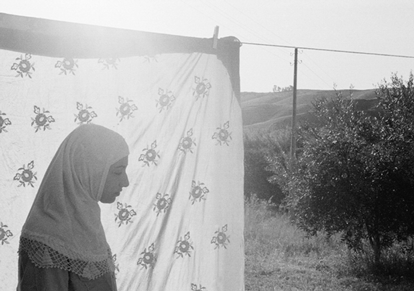By Jerry Tallmer
Her pause—five seconds of silence—spoke louder than words.
The question had been: In the making of the movie “Private,” which throws together seven Palestinians and four Israelis in a two-story house that becomes a sort of cage for all of them—had life by any chance imitated art?
The house is that of a Palestinian family in disputed territory. Into it one night bursts a Special Unit of four Israeli soldiers who take over the top floor as an observation post, warning the Arab father, mother, and all five children—two of them hardly more than toddlers—not to “play any fucking games” or go upstairs under any circumstances. If they do, they’ll be shot dead, no questions.
Hend Ayoub plays the defiant teenage daughter, Mariam, who sneaks upstairs anyway, more than once, and from a hiding place in an armoire, spies on the invaders whom the father (actor Mohammad Bakri) has dryly called “our new neighbors.”
Now, here in New York, where the film opens Friday at the Angelika, Hend Ayoub, herself a Palestinian native of Israel, contemplated that question about life and art as it applied to the actors in this movie.
“In the beginning,” she finally said, “everything was good. We got along quite well. After all, in Israel we all, as actors, used to get along in our daily life, lived close to one another, didn’t feel part of the problem. In a way, we shared the same fate.
“So in the beginning, everything went well. And then, as we shot more and more—director Saverio Costanza’s “Private” was shot in five weeks in a village in Calabria, Italy—“political problems kept popping up, and the relationship between the actors got tense.
“It got tense when we started making the scene, at night, where the Israeli soldiers break in, with guns, putting us all in the living room, and I’m yelling: ‘Where is my father?’ The actors are supposed to shout: ‘Shut up or I’ll kill you! Shut up or I’ll shoot you!” like in the script, but they [Lior Miller and three other Israeli actors] wanted to change it to be more nice.
“The director [who was also one of the screenwriters] said to them: ‘Hey, this is what’s in the script, you have to do it.’
“Well, after that it was like we were not just actors but Palestinians and Israelis. We kept on talking to each other, but it was more tense. It was difficult, you know? All the things you try to ignore come in front of you and you have to face it.”
Director Costanza, she said, “was nice to both sides. He was very neutral. You can see it from the way he humanizes the Israeli soldiers. This is an important movie because of that.”
Hend Ayoub, the young woman from Haifa who auditioned for and won the role of Mariam, was born July 24 “of no year, question mark, question mark.” The name Hend, she said, has three meanings: “one, India; two, 200 years; three, a group of camels in the desert.”
Her father is an engineer, her mother a hairdresser “who always wanted to be an actor.” Three of Hend’s uncles are in theater, and her brother is a musician.
“My mother,” the actress said, “lives in Ramallah [in the West Bank] so I know how they [Israelis] have behaved. They are not kind. They are more rude and violent. They say we are a demographic bomb, a threat to their existence.”
In the movie a crisis occurs when the youngest child, a little girl maybe 4 years old, needs to go to the bathroom at night, while her family is packed into its “prison room.” But to do that incurs risk of death for all. Just wait, be patient, the father begs. The film leaves it there. At least the film as released here.
“In the script, it was supposed to be stronger. She couldn’t hold it in. She did it on the mattress.”
This moviegoer said that, watching that scene, what had sprung into his head was the Warsaw Ghetto uprising, when infants who cried had to be strangled by their parents so that the Germans wouldn’t hear them.
The observation drew a blank, so I asked if Hend Ayoub had ever been in a house that was occupied.
“No,” she said. “I am a Palestinian living in Israel, so we don’t have occupation in that way. But we have other occupation, less visible but still painful.
“There is discrimination in employment. My family’s land was confiscated. I have a passport, I’m free to work, to move, but while we don’t have check points, at the airport I am always, always profiled. My eye cream. My lipstick. My underwear. Body search.”
And had she been to Palestine itself?
“Yes, I have an uncle there. But not much, not often. Who would want to go there?” said Hend Ayoub.
Mohammad Bakri (his first name can be spelled several ways) is a distinguished Palestinian actor/producer/director who may be remembered from as far back as Costa-Gavras’s “Hanna K.’ in 1983. Hend Ayoub has worked with him a number of times, notably in a staging of Arthur Miller’s “A View From the Bridge,” directed by Bakri two years ago. The father in “Private,” as it happens, much resembles the late Arthur Miller in face and figure.
Though she now has an ongoing role in an Israeli TV version of “Sesame Street,” Hend Ayoub thinks she’ll remain in New York for a while to see how the land lies here. Shalom.
google_ad_client = “pub-6226499064891091”;
google_ad_width = 468;
google_ad_height = 60;
google_ad_format = “468x60_as”;
google_ad_channel =”0606561524″;
google_color_border = “336699”;
google_color_bg = “FFFFFF”;
google_color_link = “0000FF”;
google_color_url = “008000”;
google_color_text = “000000”;
//–>
src=”https://pagead2.googlesyndication.com/pagead/show_ads.js”>
WWW Downtown Express































